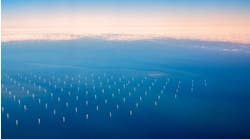Gastech 2024: More vessel owners look to convert their ships to run on hydrogen
The growing hydrogen market and its relevant safety requirements will be the focus of a session at Gastech 2024 on Wednesday morning at 10 am, with speakers scheduled from JGC, Chiyoda Corp., and Draeger.
This focus on hydrogen comes as a growing number of vessel owners and ship designers look to build or convert their ships to run on hydrogen fuel cells as a means of lowering the environmental footprint of offshore operations. Efforts have been concentrated in the growing offshore wind market, with projects focusing on designing new or converting existing crew transfer vessels, construction support vessels, service operation vessels and wind turbine installation vessels to run on hydrogen.
One recent example is Project Verdant, which aims to convert a crew transfer vessel (CTV) to run on hydrogen fuel cells while servicing offshore wind farms. Phase 1 of Project Verdant is now underway involving a preliminary design and feasibility study. If the concept is deemed viable subsequent project phases will seek to execute the concept design and test it in the field.
The project consortium is led by Orkney (Scotland)-based Green Marine, which supports the offshore renewable energy sector across Europe with marine engineering services, with project partners Waves Group and EMEC (European Marine Energy Centre).
Project Verdant’s conceptual design incorporates hydrogen fuel cells that are connected to electric motors, which can work in conjunction with the existing diesel-fueled engines, which can be shut down to enable zero emission operation at slow speed while working within offshore wind farms. This hybrid system could reduce the vessel’s CO2 emissions by up to 30% and NOx emissions by up to 40%.
Green Marine’s Managing Director Jason Schofield said the ultimate objective is to capture sufficient learning from the operation of a retro-fitted vessel to enable Green Marine to expand its fleet with new-build ZE CTVs (Zero Emissions Crew Transfer Vessels) and ultimately SOVs (service operation vessels), to support installation and maintenance activities in offshore wind farms in the UK and further afield.
Earlier this year, it was announced that an Edda Wind service vessel will take part in the Ship-aH2oy project, which will test out a new green hydrogen fuel technology. The goal of the Ship-aH2oy project is to develop a zero-emission propulsion technology on board ships using green hydrogen from a liquid organic hydrogen carrier (LOHC) on a megawatt scale.
The concept, based on the combined use of LOHC and solid oxide fuel cells (SOFC) as a powertrain, will be demonstrated on board one of Edda Wind’s commissioning/service operation vessels. Hydrogenious’ LOHC technology, with thermal oil benzyl toluene as the carrier material, will be deployed as part of the project. It is said to enable safe handling of hydrogen at ambient conditions.
Under the Ship-aH2oy project, Hydrogenious will supervise detailed design of the LOHC release unit and the integration with the service vessel, also interfacing with the SOFC supplier and supporting installation on the Edda Wind vessel.
Editor’s note: For further details on the growing hydrogen market and relevant vessel designs and upgrades, please see the feature article which appeared in the November-December 2023 issue of Offshore magazine.




